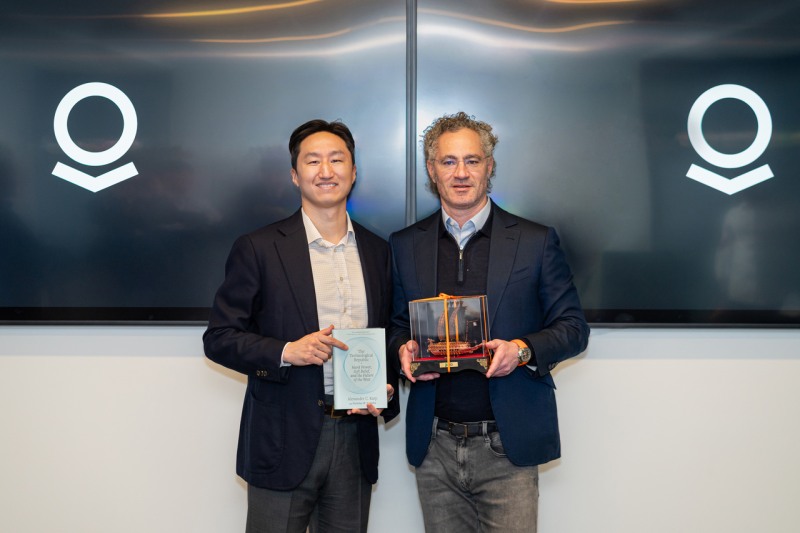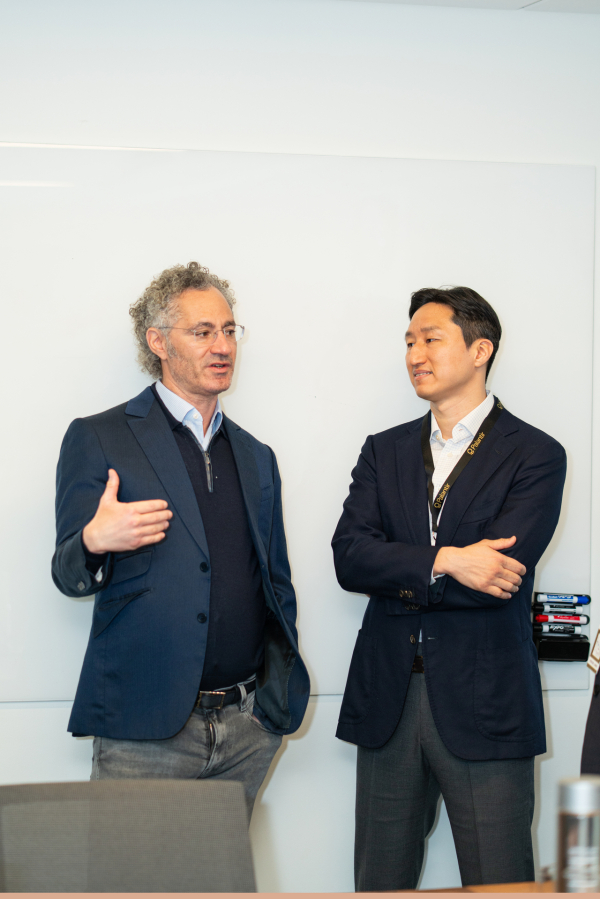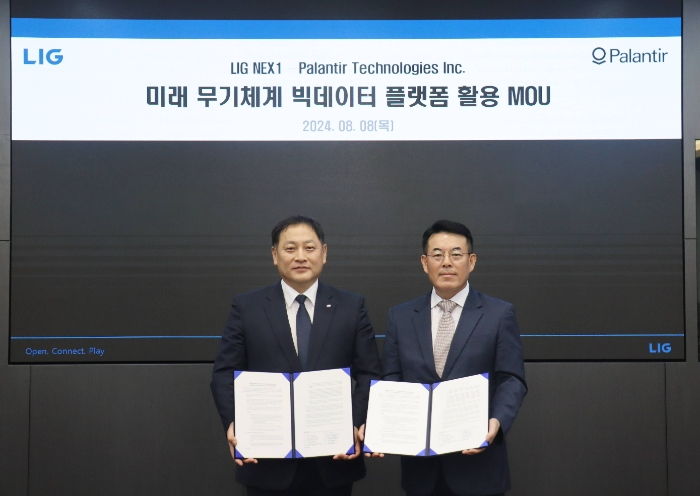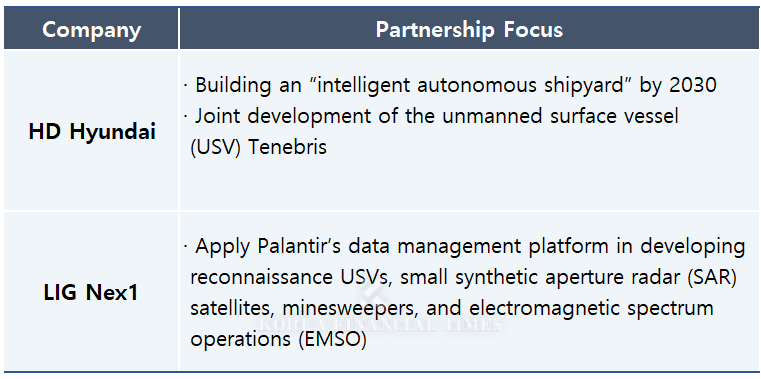
On March 6 (local time), Chung Ki-sun (left), HD Hyundai Senior Executive Vice Chairman, and Alex Karp, Palantir co-founder and CEO, pose for a commemorative photo after their meeting at Palantir's office in Washington D.C., U.S. / Photo=HD Hyundai
이미지 확대보기According to industry sources on the 5th, HD Hyundai is collaborating with Palantir on developing AI-powered future vessels, considered key to next-generation naval power, while LIG Nex1 is working with the firm across its weapon systems, including cyber, unmanned autonomous, and space sectors.
HD Hyundai: "Could Lead to Enhanced Security Capabilities for Both US and South Korea"
HD Hyundai is expanding its digital collaborations with Palantir in AI and big data across its main industries (shipbuilding, energy, and machinery), exemplified by its three shipbuilding affiliates: HD Hyundai Heavy Industries, HD Hyundai Samho, and HD Hyundai Mipo.In March this year, Chung Ki-sun, Senior Executive Vice Chairman of HD Hyundai, met with Alex Karp, co-founder and CEO of Palantir, at Palantir's Washington D.C. office to review the AI shipyard project and discuss defense cooperation.

Chung Ki-sun, HD Hyundai Senior Executive Vice Chairman (right), and Alex Karp, Palantir co-founder and CEO. / Photo=HD Hyundai
The AI shipyard project is an ongoing initiative between HD Hyundai and Palantir, which began in 2021. At that time, they jointly agreed to pursue the 'Future-oriented Shipyard (FOS)' project. FOS refers to an advanced, futuristic shipyard incorporating digital technologies such as virtual and augmented reality, data analytics, robotics, automation, and AI.
The first phase of the project, establishing a "Visible Shipyard," was completed in December 2023. Currently, the second phase, "Connected-Predictive Optimized Shipyard," is underway with a 2026 target, where AI learns from big data to derive optimal operating conditions for process management, including human resources and facilities.
HD Hyundai plans to establish an "Intelligent Autonomous Shipyard" by 2030. This is expected to improve shipbuilding site productivity by 30% and shorten vessel construction time by 30%.
Palantir plans to apply its 'Foundry' data platform to integrate digital twin, automation, robotics, virtual/augmented reality across all processes, from design to production.
Both companies have also been jointly developing the unmanned surface vessel (USV) Tenebris since September last year. The vessel features a high-performance hull with a light displacement of 14 tons and an overall length of 17 meters, equipped with Palantir’s advanced AI platform.
Through Palantir's AI and data analysis technology, HD Hyundai aims to maximize work efficiency and establish a data-driven work culture in the shipbuilding and defense sectors.
Palantir, through its partnership with HD Hyundai, seeks digital transformation (DX) in the shipbuilding and defense industries. By extending the application of its AI technology to various industries, Palantir anticipates establishing a globally competitive future shipyard ecosystem and strengthening its presence in South Korea.
Both HD Hyundai and Palantir commonly assess that this cooperation could lead to enhanced security capabilities for both the US and South Korea. They particularly share a consensus that AI-based defense solutions could become a critical element in future security strategies.
An industry official stated, "HD Hyundai expects to gain a competitive edge in future naval warfare and act as a game-changer by combining with Palantir's technology. If Palantir proves the performance and value of its platform in advanced industries such as smart shipyards and defense solutions through cooperation with HD Hyundai, it will create additional business opportunities domestically and internationally."
LIG Nex1: "Will Jointly Lead Solutions Optimized for Evolving Battlefield Environments"
LIG Nex1, well-known as a "master of guided weapons," has also partnered with Palantir. LIG Nex1 signed a "Memorandum of Understanding for Utilizing Big Data Platforms in Future Weapon Systems" with Palantir in August last year.LIG Nex1 plans to apply Palantir's data management platform to the development processes of reconnaissance unmanned surface vehicles, miniature Synthetic Aperture Radar (SAR) satellites, mine clearance, and electromagnetic spectrum operations (EMSO).
LIG Nex1 aims to strengthen its future battlefield research and development (R&D) capabilities by integrating Palantir's data infrastructure technology and AI solutions with its accumulated technological expertise in system integration fields, including unmanned systems (such as the Haegum series of marine unmanned platforms), space, and electronic warfare.

On August 8, 2024, LIG Nex1 signed a 'Memorandum of Understanding for Utilizing Big Data Platforms in Future Weapon Systems' with Palantir at LIG Nex1’s Pangyo House in Seongnam, Gyeonggi Province. Representatives from both companies pose for a commemorative photo after the signing ceremony. / Photo=LIG Nex1
이미지 확대보기Choi Jong-jin, Head of Future Battlefield Business Division at LIG Nex1, emphasized, "Securing capabilities for national defense data acquisition, management, and integration is an urgent task for advancing AI algorithms in future weapon systems. We will do our best to ensure that our cooperation with Palantir leads to jointly leading solutions optimized for evolving battlefield environments."
Palantir, through its partnership with LIG Nex1, expects to enhance national defense data capabilities by applying its big data platform and AI algorithms to future weapon systems, further anticipating synergies in the advanced defense sector.
However, some voices express concerns about the potential leakage of national security information. Given that Palantir has established a global military data-centric platform through long-standing cooperation with the US Department of Defense, there are warnings that domestic defense companies must prepare for numerous data security issues directly related to national security during international cooperation.
In addition, the adoption of AI technology for military use raises legal and ethical controversies among political and civil rights circles both domestically and internationally. An industry official commented, "It will be necessary to review society's acceptance of using AI weapon systems militarily and of utilizing sensitive information, such as personal data."
Jeong Chaeyun (chaeyun@fntimes.com)

































![[DCM] JTBC · HL D&I 7%대...재무 취약기업 조달비용 급등 [2025 결산⑥]](https://cfnimage.commutil.kr/phpwas/restmb_setimgmake.php?pp=006&w=69&h=45&m=5&simg=2026013013251003407141825007d12411124362.jpg&nmt=18)
![NH투자증권, 순이익 '1조 클럽' 기록…윤병운 대표 "전 사업부문 경쟁력 강화" [금융사 2025 실적]](https://cfnimage.commutil.kr/phpwas/restmb_setimgmake.php?pp=006&w=69&h=45&m=5&simg=2025021021370308671179ad439072211389183.jpg&nmt=18)


![다올투자증권, 연간 흑자 달성 성공…황준호 대표 실적 안정화 견인 [금융사 2025 실적]](https://cfnimage.commutil.kr/phpwas/restmb_setimgmake.php?pp=006&w=69&h=45&m=5&simg=2025081416515608997179ad439072111812010.jpg&nmt=18)
![[DCM] 이랜드월드, KB증권 미매각 눈물…NH증권이 닦았다](https://cfnimage.commutil.kr/phpwas/restmb_setimgmake.php?pp=006&w=69&h=45&m=5&simg=2026013006550302626a837df6494123820583.jpg&nmt=18)












![[카드뉴스] 매파·비둘기부터 올빼미·오리까지, 통화정책 성향 읽는 법](https://cfnimage.commutil.kr/phpwas/restmb_setimgmake.php?pp=006&w=298&h=298&m=1&simg=202601281456119025de68fcbb3512411124362_0.jpg&nmt=18)
![[카드뉴스] 하이퍼 인플레이션, 왜 월급이 종잇조각이 될까?](https://cfnimage.commutil.kr/phpwas/restmb_setimgmake.php?pp=006&w=298&h=298&m=1&simg=202601141153149784de68fcbb3512411124362_0.jpg&nmt=18)
![[카드뉴스] 주식·채권·코인까지 다 오른다, 에브리싱 랠리란 무엇일까?](https://cfnimage.commutil.kr/phpwas/restmb_setimgmake.php?pp=006&w=298&h=298&m=1&simg=202601071630263763de68fcbb3512411124362_0.jpg&nmt=18)
![[카드뉴스] “이거 모르고 지나치면 손해입니다… 2025 연말정산 핵심 정리”](https://cfnimage.commutil.kr/phpwas/restmb_setimgmake.php?pp=006&w=298&h=298&m=1&simg=202601061649137526de68fcbb3512411124362_0.jpg&nmt=18)
![[카드뉴스] KT&G, 제조 부문 명장 선발, 기술 리더 중심 본원적 경쟁력 강화](https://cfnimage.commutil.kr/phpwas/restmb_setimgmake.php?pp=006&w=298&h=298&m=1&simg=202509241142445913de68fcbb3512411124362_0.png&nmt=18)
![[신간] 고수의 M&A 바이블](https://cfnimage.commutil.kr/phpwas/restmb_setimgmake.php?pp=006&w=81&h=123&m=5&simg=2025091008414900330f8caa4a5ce12411124362.jpg&nmt=18)
![[신간] 리빌딩 코리아 - 피크 코리아 극복을 위한 생산성 주도 성장 전략](https://cfnimage.commutil.kr/phpwas/restmb_setimgmake.php?pp=006&w=81&h=123&m=5&simg=2025032814555807705f8caa4a5ce12411124362.jpg&nmt=18)
![[서평] 추세 매매의 대가들...추세추종 투자전략의 대가 14인 인터뷰](https://cfnimage.commutil.kr/phpwas/restmb_setimgmake.php?pp=006&w=81&h=123&m=5&simg=2023102410444004986c1c16452b0175114235199.jpg&nmt=18)

![[신간] 이게 화낼 일인가?](https://cfnimage.commutil.kr/phpwas/restmb_setimgmake.php?pp=006&w=81&h=123&m=5&simg=2026010610254801367f8caa4a5ce12411124362.jpg&nmt=18)
![[신간] 조금 느려도 괜찮아...느림 속에서 발견한 마음의 빛깔](https://cfnimage.commutil.kr/phpwas/restmb_setimgmake.php?pp=006&w=81&h=123&m=5&simg=20251105082239062852a735e27af12411124362.jpg&nmt=18)

![[AD] 현대차, 글로벌 안전평가 최고등급 달성 기념 EV 특별 프로모션](https://cfnimage.commutil.kr/phpwas/restmb_setimgmake.php?pp=006&w=89&h=45&m=1&simg=20260106160647050337492587736121125197123.jpg&nmt=18)
![[AD] 현대차 ‘모베드’, CES 2026 로보틱스 부문 최고혁신상 수상](https://cfnimage.commutil.kr/phpwas/restmb_setimgmake.php?pp=006&w=89&h=45&m=1&simg=20260105103413003717492587736121125197123.jpg&nmt=18)
![[AD] 기아 ‘PV5’, 최대 적재중량 1회 충전 693km 주행 기네스 신기록](https://cfnimage.commutil.kr/phpwas/restmb_setimgmake.php?pp=006&w=89&h=45&m=1&simg=20251105115215067287492587736121125197123.jpg&nmt=18)
![[카드뉴스] KT&G, 제조 부문 명장 선발, 기술 리더 중심 본원적 경쟁력 강화](https://cfnimage.commutil.kr/phpwas/restmb_setimgmake.php?pp=006&w=89&h=45&m=1&simg=202509241142445913de68fcbb3512411124362_0.png&nmt=18)
![[AD]‘황금연휴에 즐기세요’ 기아, ‘미리 추석 페스타’ 이벤트 실시](https://cfnimage.commutil.kr/phpwas/restmb_setimgmake.php?pp=006&w=89&h=45&m=1&simg=20250903093618029117492587736121166140186.jpg&nmt=18)



